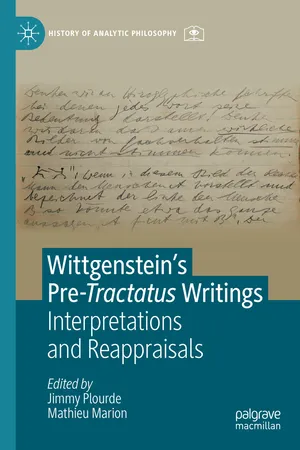
Wittgenstein’s Pre-Tractatus Writings
Interpretations and Reappraisals
- English
- ePUB (mobile friendly)
- Available on iOS & Android
About this book
This volume brings into focus the unique philosophical and historical importance of Wittgenstein's pre-Tractatus writings. These contributed essays show that Wittgenstein's earliest writings are worth studying for their own sake. They also reveal how much one can still learn about the Tractatus, if we are to study these early writings not as documenting one's prior interpretation of the Tractatus, but as a series of steps in Wittgenstein's thought, some down paths that are later abandoned, some leading towards it. The volume thus offers not only a fresh perspective on the pre-Tractatus writings, but also a comprehensive reading of a wide range of central topics from the very first letters, the "Notes on Logic", the "Notes dictated to G.E. Moore" to the three surviving war-time notebooks
Frequently asked questions
- Essential is ideal for learners and professionals who enjoy exploring a wide range of subjects. Access the Essential Library with 800,000+ trusted titles and best-sellers across business, personal growth, and the humanities. Includes unlimited reading time and Standard Read Aloud voice.
- Complete: Perfect for advanced learners and researchers needing full, unrestricted access. Unlock 1.4M+ books across hundreds of subjects, including academic and specialized titles. The Complete Plan also includes advanced features like Premium Read Aloud and Research Assistant.
Please note we cannot support devices running on iOS 13 and Android 7 or earlier. Learn more about using the app.
Information
Table of contents
- Cover
- Front Matter
- 1. Introduction
- 2. Wittgenstein’s Pre-Tractatus Conception of Philosophy: From the Originally Assumed View of the Task of Philosophy to the Symbolic Turn and Isomorphism
- 3. The Early Wittgenstein’s Atomic Logic, Categories and the Necessary A Posteriori
- 4. A Path to the Tractatus: From Facts and Forms Through Picturing to Modality
- 5. Essence and Modality: From Husserl to Wittgenstein
- 6. Is There Room for a Transcendental Aesthetic in Wittgenstein’s Early Thought?
- 7. How Does a Tautology Say Nothing?
- 8. Analysis of a Conversation on the Sheffer Stroke and WF Schemes between Bertrand Russell and Ludwig Wittgenstein in April 1913
- 9. Wittgenstein on Negation, Bipolarity, and Symmetry
- 10. “To fulfill the purpose of existence”: Wittgenstein’s Notebooks and the Search for Meaning
- Back Matter